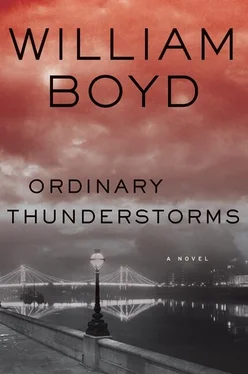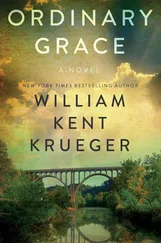Ingram fell silent.
“I don’t want you to worry, Ingram. Burton Keegan is holding everything together, keeping the police at bay. It would look very bad to arrest and prosecute a man so close to — so seriously ill.”
“Good old Burton.”
Chandra took his hand again and said with real feeling, “I’m so pleased to see you, Ingram. And I’m so sorry this has happened.”
Ingram frowned, gently releasing his hand from Chandra’s grip. “That’s the thing: I really don’t understand how it happened. That’s what bothers me: everything seemed on course, all was fine and dandy.”
Chandra shrugged, spread his hands. “Who are we to speak? To seek neat answers? Who can predict what life will bring us?”
“Very true.”
Ingram asked Chandra to pour him half an inch of Lachlan’s whisky. He sipped it — throat burning. He smelt burnt barley, peat, clear Scottish rivers. It emboldened him.
“I want to know where I stand, Chandra. Bottom line. Don’t spare me — now that everything’s gone pear-shaped.”
“I did some quick analysis before I came,” Chandra said, retrospective disbelief distorting his features for a moment. “It’s not good…Last month you were worth more than £200 million. Now…” He took out his phone and punched numbers into it. Ingram wondered for a moment if he was calling someone but he remembered you could do everything on a mobile phone now, everything.
Chandra held the phone away from him as if he were dubious of the reading he was receiving. “Now I would say your assets were worth £10 million — give or take £100,000 here or there. Baseball park figure.” Chandra smiled. “Of course, I’m not including your properties.”
“So there is some light in this darkness.”
“A gleam of light, Ingram. You can still live reasonably well. You are not a poor man. But you must be prudent.”
He handed Ingram a few documents for signature. Ingram might have well been signing his remaining assets away, for all he knew, but he trusted Chandra. And you couldn’t live in a world without trusting people, as he had so recently and callously discovered. Chandra would make sure he was all right, that Meredith and his family were all right with what remained. There might have to be some down-sizing, some belt-tightening, but, as Chandra said, he was not a poor man. Or so he hoped, he thought, suddenly less sanguine. Who could predict what life would bring us? — as Chandra had just reminded him.
Chandra gathered up his documents, shook Ingram’s hand and reassured him all would be well. As he left, a nurse poked her head around the door.
“Are you up for any more visitors, Mr Fryzer? Mr Shah said not to tire you out.”
“It depends who it is,” Ingram said, thinking that if it’s the Serious Fraud Office, I’m comatose.
“It’s your son.”
“Oh, well, that’s fine.” He called out: “Guy, come on in.”
Fortunatus stepped into the room.
“‘Fraid it’s me, Dad.”
He had a bunch of flowers in his dirty hand, dark purple flowers with waxy leaves that were already giving off a powerful scent, filling the room. Forty handed them over.
“What’re these?” Ingram asked, immeasurably touched.
“Freesias. My favourites. I just cut them for you. We do a garden not far from here.”
Forty looked as though he’d just come out of the front line — the usual filthy combat jacket over baggy, greasy jeans, his head now shaved egg-smooth. Ingram looked at him in wonder.
“How’re you doing, Dad?”
“I’ve decided to adopt your hairstyle. Trying to look like you.”
Fortunatus laughed nervously.
“They shaved all my hair off and then hoiked out half my brain.”
“No need to go that far,” Forty said.
They both laughed at that. Ingram laughed harder and felt his body heave in response.
“I love you, Forty,” he said. “That’s why I want to look like you.”
“Dad,” Forty said, awkward. “Please don’t cry.”
IT WAS STRANGE SEEING YOUR PICTURE IN THE NEWSPAPER, JONJO thought, particularly if you’d never had your picture in any newspaper before. It was a photograph taken some fifteen years earlier, he calculated, when he’d been in the British Army, and was captioned: “John-Joseph Case, wanted by police to assist in their enquiries into the murder of Dr Philip Wang.” He crumpled the newspaper into a ball and hurled it at the rear window of his camper-van. It bounced off the angled Perspex on to the carpeted floor — where The Dog immediately pounced on it, picked it up and brought it back, dropping it at his feet and stood there waiting, tail wagging, for this new game to continue.
Jonjo picked The Dog up and heaved him into his arms, turning him on his back like a baby. The Dog enjoyed being held like this and he licked Jonjo’s face with his big wet tongue. Jonjo hugged The Dog to him, confused by the emotions he was experiencing and said out loud, “Sorry, mate, but there’s no other way,” and dropped him carefully on the floor again. It was two hours to high tide, no point in hanging around.
Disturbed by this personal publicity, Jonjo went into the camper-van’s tiny toilet and looked at himself in the mirror above the sink. The beard was coming on pretty well — the black still intense, though he might need to re-dye it in a couple of days if it kept growing at this rate and in a funny sort of way he thought that he suited being dark: he looked better than he usually did with his normal gingery-brown crew cut and it was an added bonus that his most recognisable feature, the cleft in his chin, was now obscured by the facial hair. Perhaps he should have grown a beard ages ago, he wondered, but at least he now looked nothing like the picture in the paper, he was glad to say. Following Kindred’s lead, he thought to himself, uncomfortably, taking a leaf out of Adam Kindred’s book of disappearance and evasion. Everything in his life had been running fairly smoothly — no complaints, thanks — until Kindred had arrived. He had survived the Falklands War, Northern Ireland, Gulf War I, Bosnia, Gulf War II, Iraq and Afghanistan — and only when the Kindred element intruded had everything gone arse-over-tit. He told himself to calm down.
He put his Clock in his pocket and picked up the spade.
“Come on, boy,” he said. “Walkies.”
He stepped out of the camper-van and inhaled. It was a fine afternoon — sunshine and thin high clouds invading the sky from the South — east — an English summer’s day with a cool breeze coming off the estuary. He had found himself a berth in a new caravan⁄campsite — not far from the seafront — on Canvey Island, Essex, a curious, sunken sea-walled enclave on the Thames between Basildon and Southend-on-Sea, a strange backwater of abandoned oil refineries with grassed-over concrete roads and rusting street lights, and huge functioning oil refineries and storage depots, gleamingly lit at night, venting steam and orange flares behind their diamond-mesh perimeter fencing, serving the vast tankers that docked at great steel jetties that poked out into the river estuary. Dotted along the Canvey sea wall were occasional neat art deco cafes that recalled the island’s past as a Londoners’ convenient holiday resort but that now, as far as he could tell from the few days he had been living here, kept their own bizarrely sporadic hours of opening and closing: sometimes you were lucky, sometimes you weren’t.
During his Canvey Island sojourn Jonjo had kept himself to himself, going for walks with The Dog, circumnavigating the island by way of the sea wall path twice, clockwise and anti-clockwise, deliberately not becoming over-acquainted with his camper-van and caravanning neighbours on either side, ensuring that any conversations were brief but friendly enough, all the same.
Читать дальше












